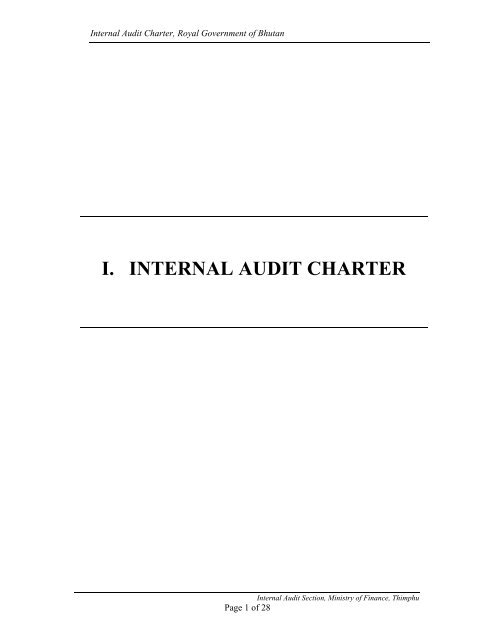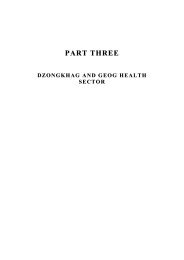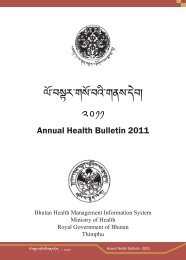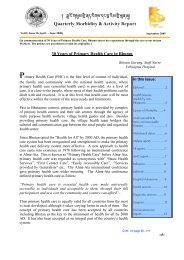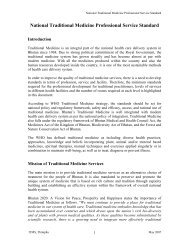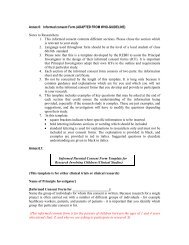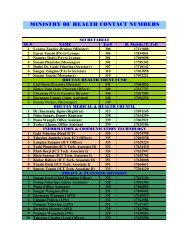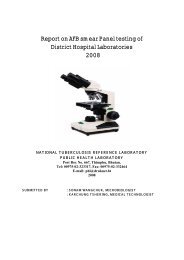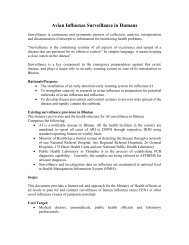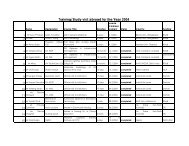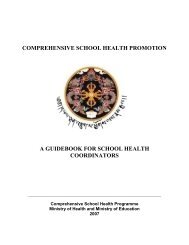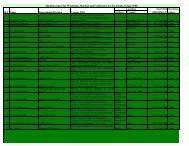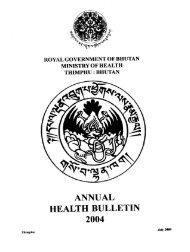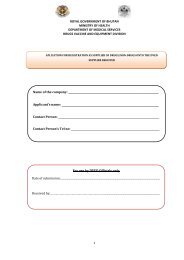I. INTERNAL AUDIT CHARTER - Ministry of Health
I. INTERNAL AUDIT CHARTER - Ministry of Health
I. INTERNAL AUDIT CHARTER - Ministry of Health
You also want an ePaper? Increase the reach of your titles
YUMPU automatically turns print PDFs into web optimized ePapers that Google loves.
Internal Audit Charter, Royal Government <strong>of</strong> Bhutan<br />
I. <strong>INTERNAL</strong> <strong>AUDIT</strong> <strong>CHARTER</strong><br />
Internal Audit Section, <strong>Ministry</strong> <strong>of</strong> Finance, Thimphu<br />
Page 1 <strong>of</strong> 28
Internal Audit Charter, Royal Government <strong>of</strong> Bhutan<br />
I. Internal Audit Charter:<br />
1. Purpose:<br />
The purpose <strong>of</strong> this Charter is to provide a framework within which the internal<br />
audit shall function in the Ministries/Agencies <strong>of</strong> the Royal Government <strong>of</strong><br />
Bhutan. It is a formal document giving authority and defining the roles &<br />
responsibilities <strong>of</strong> Internal Audit. It ensures uniformity and consistency in the<br />
Internal Audit functions and enhances good governance across the ministries<br />
and agencies <strong>of</strong> the Royal Government <strong>of</strong> Bhutan.<br />
2. Mission and objectives:<br />
The mission <strong>of</strong> internal audit shall be to provide independent, objective<br />
assurance and consulting services designed to add value and improve the<br />
organization’s operations. It helps the organization accomplish its objectives by<br />
bringing a systematic, disciplined approach to evaluate and improve the<br />
effectiveness <strong>of</strong> risk management, control and governance processes.<br />
3. Scope:<br />
The scope <strong>of</strong> Internal Audit shall encompass all the entities under the<br />
<strong>Ministry</strong>/Agency<br />
The scope <strong>of</strong> work <strong>of</strong> the Internal Audit shall be to:<br />
3.1. review organizational goals/objectives, policies, plans and procedures.<br />
3.2. ensure economy, efficiency and effectiveness <strong>of</strong> operations and<br />
various management practices.<br />
3.3. ensure compliance to various laws, rules and regulations.<br />
3.4. review adequacy and effectiveness <strong>of</strong> the internal control/management<br />
systems.<br />
3.5. carry out special investigations.<br />
Internal Audit Section, <strong>Ministry</strong> <strong>of</strong> Finance, Thimphu<br />
Page 2 <strong>of</strong> 28
Internal Audit Charter, Royal Government <strong>of</strong> Bhutan<br />
4. Roles and responsibilities:<br />
The role and responsibilities <strong>of</strong> Internal Audit shall be to:<br />
4.1 provide assurance to the management on various management practices<br />
and procedures through the following:<br />
4.1.1 ensure compliance with laws, rules and regulations<br />
4.1.2 ensure the economy, efficiency and effectiveness <strong>of</strong> operations<br />
4.1.3 assess the implementation <strong>of</strong> policies & plans.<br />
4.1.4 review the achievement <strong>of</strong> goals and objectives<br />
4.2 provide diagnostic and advisory services for improvement <strong>of</strong><br />
management systems through the following.<br />
4.2.1 carry out special investigations.<br />
4.2.2 review the safeguarding <strong>of</strong> assets & properties.<br />
4.2.3 examine the appropriateness and effectiveness <strong>of</strong> the management<br />
systems including internal controls.<br />
4.2.4 ensure that the actions are taken by the management on the<br />
recommendations.<br />
5. Independence:<br />
The internal audit shall be administratively under the Ministries/Agencies but<br />
shall be independent within the <strong>Ministry</strong>/Agency for all its operational purposes.<br />
It shall:<br />
5.1. report only to the Head <strong>of</strong> Secretariat/ <strong>Ministry</strong>/ Agency.<br />
5.2. not be involved in daily operations and activities; and have no<br />
management or executive powers, authorizations, functions or duties<br />
except those relating to internal audit functions.<br />
Internal Audit Section, <strong>Ministry</strong> <strong>of</strong> Finance, Thimphu<br />
Page 3 <strong>of</strong> 28
Internal Audit Charter, Royal Government <strong>of</strong> Bhutan<br />
6. Authority:<br />
The internal audit shall:<br />
6.1. have full access to all relevant <strong>of</strong>ficial information, records and property.<br />
6.2. have full access to the management and staff <strong>of</strong> the <strong>Ministry</strong>/Agency.<br />
6.3. decide on the audit plan and the entity to be audited.<br />
6.4. get necessary assistance <strong>of</strong> experts for the specialized services from<br />
within or outside the organization.<br />
7. Accountability <strong>of</strong> Head <strong>of</strong> Internal Audit:<br />
The Internal Audit Head shall be accountable for:<br />
7.1. effective management <strong>of</strong> Internal Audit functions in the <strong>Ministry</strong>/Agency<br />
by providing necessary pr<strong>of</strong>essional, technical and operative guidance in<br />
accordance with the Generally Accepted Internal Auditing Standards.<br />
7.2. strategic planning, programming and execution <strong>of</strong> audit activities.<br />
7.3. preparation <strong>of</strong> annual audit plan.<br />
7.4. providing continuous and timely internal audit service to the<br />
<strong>Ministry</strong>/Agency.<br />
8 Reporting<br />
The internal audit shall submit written reports on the activity carried out to the<br />
respective Head <strong>of</strong> <strong>Ministry</strong>/Agency with a copy to the audited entity for<br />
information.<br />
9. Standards and Code <strong>of</strong> Ethics:<br />
Internal audit shall be governed by Internal Audit Standards.<br />
Internal Auditors shall abide by Code <strong>of</strong> Ethics for Internal Auditors.<br />
Internal Audit Section, <strong>Ministry</strong> <strong>of</strong> Finance, Thimphu<br />
Page 4 <strong>of</strong> 28
Internal Audit Charter, Royal Government <strong>of</strong> Bhutan<br />
10. Role <strong>of</strong> Coordinating Agency:<br />
As per the Public Finance Act <strong>of</strong> Bhutan 2007, Section 23 (O), the <strong>Ministry</strong> <strong>of</strong><br />
Finance shall be the Coordinating Agency and shall:<br />
10.1. coordinate the overall Internal Audit functions in different<br />
Ministries /Agencies effectively.<br />
10.2. ensure quality, uniformity and consistency <strong>of</strong> Internal Audit<br />
System across the Ministries/ Agencies.<br />
10.3. develop and modify the Charter/Mandates, Manuals, Code <strong>of</strong><br />
Ethics and Internal Audit Standards.<br />
10.4. render advice, technical backstopping and consultation to the<br />
Internal Audit Units as and when required.<br />
10.5. issue Guidelines to Internal Auditors.<br />
10.6. promote understanding, acceptance and utilization <strong>of</strong> Internal Audit<br />
services by all levels <strong>of</strong> Management.<br />
10.7. enhance the skills, techniques and knowledge <strong>of</strong> Internal Auditors.<br />
10.8. coordinate recruitments, transfers, promotions and develop career<br />
path for Internal Auditors.<br />
10.9. develop job descriptions for Internal Auditors.<br />
10.10. formulate and adopt the standards for the pr<strong>of</strong>essional practice <strong>of</strong><br />
Internal Audit.<br />
10.11. create awareness <strong>of</strong> Internal Audit System among the stakeholders.<br />
10.12. facilitate affiliation to World Body <strong>of</strong> Institute <strong>of</strong> Internal Auditors.<br />
11. Charter Amendments:<br />
To keep pace with the fast changing environment, this Charter shall be dynamic<br />
and updated as and when the need arises.<br />
Internal Audit Section, <strong>Ministry</strong> <strong>of</strong> Finance, Thimphu<br />
Page 5 <strong>of</strong> 28
Code <strong>of</strong> Ethics for Internal Auditors, Royal Government <strong>of</strong> Bhutan<br />
II. CODE OF ETHICS<br />
FOR<br />
<strong>INTERNAL</strong> <strong>AUDIT</strong>ORS<br />
Internal Audit Section, <strong>Ministry</strong> <strong>of</strong> Finance, Thimphu<br />
Page 6 <strong>of</strong> 28
Code <strong>of</strong> Ethics for Internal Auditors, Royal Government <strong>of</strong> Bhutan<br />
II. Code <strong>of</strong> Ethics for Internal Auditors:<br />
Introduction<br />
The Code <strong>of</strong> Ethics <strong>of</strong> the Internal Auditors presents a comprehensive<br />
declaration <strong>of</strong> values and principles which should accompany the everyday<br />
work <strong>of</strong> internal auditors in the Ministries/Agencies. The Code covers ethical<br />
demands for the internal auditors’ pr<strong>of</strong>ession.<br />
The behaviour <strong>of</strong> internal auditors should be always and at all events<br />
irreproachable. A code <strong>of</strong> ethics is necessary and appropriate for the pr<strong>of</strong>ession<br />
<strong>of</strong> internal auditing, founded on the trust placed in its objective assurance about<br />
risk management, control, and governance. The Code <strong>of</strong> Ethics extends beyond<br />
the definition <strong>of</strong> internal auditing to include two essential components:<br />
A. Principles that is relevant to the pr<strong>of</strong>ession and practice <strong>of</strong> internal<br />
auditing;<br />
B. Rules <strong>of</strong> Conduct that describe behavioural norms expected <strong>of</strong> internal<br />
auditors, helping to interpret the Principles into practical applications,<br />
intended to guide the ethical conduct <strong>of</strong> internal auditors.<br />
This Code applies to both individuals and entities that provide internal auditing<br />
services. The internal auditors are required to apply and uphold the following<br />
principles and rules in addition to Bhutan Civil Service Code <strong>of</strong> Conduct and<br />
Ethics:<br />
Internal Audit Section, <strong>Ministry</strong> <strong>of</strong> Finance, Thimphu<br />
Page 7 <strong>of</strong> 28
Code <strong>of</strong> Ethics for Internal Auditors, Royal Government <strong>of</strong> Bhutan<br />
12. INDEPENDENCE<br />
For internal auditors it is indispensable to maintain their independence as<br />
one <strong>of</strong> the most important attributes <strong>of</strong> their activities, both in relation to<br />
the auditees and to other external interest groups.<br />
Rules <strong>of</strong> Conduct<br />
Internal Auditors shall:<br />
12.1 . refrain from any activity which might retract them into unexpected<br />
interests and spheres and so discredit their independence when auditing;<br />
12.2 . protect their independence from political influence/ pressure;<br />
12.3 . avoid both personal and external interest.<br />
12.4 . protect their independence by refusing gifts or favours which might<br />
influence or might be understood as influencing their independence and<br />
impartiality.<br />
13. INTEGRITY<br />
The integrity <strong>of</strong> internal auditors establishes trust and thus provides the<br />
basis for reliance on their judgment, establishing the credibility.<br />
Rules <strong>of</strong> Conduct<br />
The internal auditors shall:<br />
13.1. perform their job honestly, diligently and with responsibility;<br />
13.2. perform their work in harmony with the acts and other generally<br />
binding regulations;<br />
13.3. avoid any illegal activity or any activity which discredits the internal<br />
auditors’ pr<strong>of</strong>ession;<br />
13.4. respect the legal and ethical objectives <strong>of</strong> the government policies and<br />
contribute to their realization;<br />
13.5. take care that their integrity is not compromised.<br />
Internal Audit Section, <strong>Ministry</strong> <strong>of</strong> Finance, Thimphu<br />
Page 8 <strong>of</strong> 28
Code <strong>of</strong> Ethics for Internal Auditors, Royal Government <strong>of</strong> Bhutan<br />
14. OBJECTIVITY<br />
The internal auditors shall show the highest level <strong>of</strong> pr<strong>of</strong>essional objectivity<br />
while conducting audits. The internal auditors shall make balanced<br />
assessment <strong>of</strong> all relevant circumstances and ensure that they are not<br />
unduly influenced by their own interests or by others in forming<br />
judgments.<br />
Rules <strong>of</strong> Conduct<br />
The internal auditors shall:<br />
14.1. avoid taking part in activities or relations which may damage, or might<br />
be understood as damaging their unbiased assessment including<br />
activities or relations which may be in conflict with public interests;<br />
14.2. avoid accepting anything that may damage or might be understood as<br />
damaging their objective pr<strong>of</strong>essional assessment;<br />
14.3. protect their objectivity against political influence;<br />
14.4. disclose all substantial facts known to them that – being undisclosed –<br />
might misrepresent the conclusions on activities or events assessed.<br />
15. CONFIDENTIALITY:<br />
The internal auditors shall respect the value and ownership <strong>of</strong> the<br />
information they receive and not disclose information without appropriate<br />
authority unless there is legal or pr<strong>of</strong>essional obligation to do so.<br />
Rules <strong>of</strong> Conduct<br />
The internal auditors shall:<br />
15.1. be careful when using and protecting information they gathered when<br />
auditing;<br />
15.2. avoid disclosing and making use <strong>of</strong> the information obtained during<br />
internal auditing in order to damage the interests <strong>of</strong> other person or<br />
organization;<br />
Internal Audit Section, <strong>Ministry</strong> <strong>of</strong> Finance, Thimphu<br />
Page 9 <strong>of</strong> 28
Code <strong>of</strong> Ethics for Internal Auditors, Royal Government <strong>of</strong> Bhutan<br />
15.3. avoid making use <strong>of</strong> the information obtained during auditing for<br />
personal enrichment or in a way which would be in conflict with the<br />
law or which would damage legitimate and ethical interests <strong>of</strong> the<br />
audited entity.<br />
16. COMPETENCY:<br />
The internal auditors shall make use <strong>of</strong> their knowledge, skills and<br />
practical experience necessary for auditing performance.<br />
Rules <strong>of</strong> Conduct<br />
The internal auditors shall:<br />
16.1. be active only in those scopes <strong>of</strong> auditors’ activities for which they<br />
have the necessary knowledge, skills and experience;<br />
16.2. perform the auditing in harmony with the Internal Audit Charter,<br />
Standards and Manuals issued by the <strong>Ministry</strong> <strong>of</strong> Finance;<br />
16.3. keep educating themselves constantly in order to have good command<br />
<strong>of</strong> internal audit techniques and Internal audit standards necessary for<br />
obtaining, examining and evaluating the information;<br />
16.4. update regularly on any changes in Acts and other legal prescriptions<br />
regulating their activity scopes and shall observe them in their<br />
pr<strong>of</strong>ession.<br />
17. ETHICAL BEHAVIOUR AND SOUND RELATIONS<br />
The internal auditors shall behave decently and in harmony with the<br />
generally recognized moral and ethical principles.<br />
Rules <strong>of</strong> Conduct<br />
The internal auditors shall:<br />
17.1. behave in ethical way and shall not act against legitimate and lawful<br />
interests <strong>of</strong> the audited entity;<br />
Internal Audit Section, <strong>Ministry</strong> <strong>of</strong> Finance, Thimphu<br />
Page 10 <strong>of</strong> 28
Code <strong>of</strong> Ethics for Internal Auditors, Royal Government <strong>of</strong> Bhutan<br />
17.2. co-operate correctly with other entities whose services are<br />
constructively related to the activity <strong>of</strong> the auditee;<br />
17.3. behave fairly and correctly towards their colleagues, in a way<br />
supporting good relations and co-operation among internal auditors.<br />
18. CONFLICT OF INTERESTS<br />
During auditing the internal auditors shall ensure that their personal<br />
interests and ambitions do not become an obstacle for the objective and<br />
impartial assessment <strong>of</strong> activities and events at the audited entity.<br />
Rules <strong>of</strong> Conduct<br />
The internal auditors shall:<br />
18.1. avoid any conflict <strong>of</strong> interests and gifts which might influence their<br />
independence and impartiality;<br />
18.2. avoid any relations with senior executives and with other employees<br />
<strong>of</strong> the audited entity the same as with other parties which might<br />
influence, compromise or threaten their ability to act independently;<br />
18.3. not make use <strong>of</strong> their <strong>of</strong>ficial status for private purposes and shall<br />
avoid the relations bringing corruption risk or which may cast doubts<br />
upon their objectivity<br />
Internal Audit Section, <strong>Ministry</strong> <strong>of</strong> Finance, Thimphu<br />
Page 11 <strong>of</strong> 28
Government Internal Audit Standards, Royal Government <strong>of</strong> Bhutan<br />
III. GOVERNMENT<br />
<strong>INTERNAL</strong> <strong>AUDIT</strong> STANDARDS<br />
Internal Audit Section, <strong>Ministry</strong> <strong>of</strong> Finance, Thimphu<br />
Page 12 <strong>of</strong> 28
Government Internal Audit Standards, Royal Government <strong>of</strong> Bhutan<br />
III. Government Internal Audit Standard<br />
INTRODUCTION<br />
The standards are the criteria by which the operations <strong>of</strong> Internal Audit are evaluated<br />
and measured, to represent the practice <strong>of</strong> Internal Audit as it should be. They also<br />
define the way in which the internal audit service should be established and undertake<br />
its functions.<br />
The Standards form two groupings. The first encompasses the organizational and<br />
structural aspects; the second encompasses the activity and operation <strong>of</strong> internal<br />
audit:<br />
19. Organizational Standards<br />
19.1 Independence<br />
19.2 Relationships with management, other auditors and review<br />
bodies<br />
19.3 Staffing, training and development<br />
20. Operational Standards<br />
20.1 Audit strategy<br />
20.2 Management <strong>of</strong> audit assignments<br />
20.3 Due pr<strong>of</strong>essional care<br />
20.4 Reporting<br />
20.5 Quality assurance<br />
DEFINITION OF <strong>INTERNAL</strong> <strong>AUDIT</strong><br />
Internal auditing is an independent, objective assurance and consulting activity<br />
designed to add value and improve an organization’s operations. It helps an<br />
organization accomplish its objectives by bringing a systematic, disciplined<br />
approach to evaluate and improve the effectiveness <strong>of</strong> risk management,<br />
control, and governance processes.<br />
Internal Audit Section, <strong>Ministry</strong> <strong>of</strong> Finance, Thimphu<br />
Page 13 <strong>of</strong> 28
Government Internal Audit Standards, Royal Government <strong>of</strong> Bhutan<br />
19 ORGANISATIONAL STANDARDS:<br />
19.1. INDEPENDENCE<br />
19.1.1. The principles <strong>of</strong> independence<br />
(a)<br />
(b)<br />
Internal Audit should be sufficiently independent <strong>of</strong> the activities which<br />
it audits to enable auditors to perform their duties in a manner which<br />
facilitates impartial and effective pr<strong>of</strong>essional judgements and<br />
recommendations. They should have no executive responsibilities.<br />
Accountability for the response to the advice and recommendations <strong>of</strong><br />
Internal Audit lies with the line Ministries/Agencies who accept and<br />
implement the advice formally.<br />
19.1.2 Organizational independence<br />
(a)<br />
(b)<br />
(c)<br />
Internal Audit is primarily a service to, and should report directly to the<br />
Head <strong>of</strong> <strong>Ministry</strong>/Agency.<br />
The Head <strong>of</strong> <strong>Ministry</strong>/Agency should be appraised on the discharge <strong>of</strong><br />
the responsibilities <strong>of</strong> Internal Audit.<br />
The Head <strong>of</strong> <strong>Ministry</strong>/Agency should make appropriate arrangements<br />
for the provision and management <strong>of</strong> the budget and resources <strong>of</strong><br />
internal audit.<br />
19.1.3 Status <strong>of</strong> the Head <strong>of</strong> Internal Audit.<br />
The Head <strong>of</strong> Internal Audit should be <strong>of</strong> reasonable seniority and experienced<br />
to facilitate the effective discussion and negotiation <strong>of</strong> the results <strong>of</strong> internal<br />
audit work with senior management in the organization.<br />
16<br />
19.1.4 Independence <strong>of</strong> individual auditors.<br />
(a)<br />
Individual auditors should have an impartial, unbiased attitude,<br />
characterized by integrity and an objective approach to work, and should<br />
avoid conflicts <strong>of</strong> interest. They should not allow external factors to<br />
compromise their pr<strong>of</strong>essional judgement.<br />
Internal Audit Section, <strong>Ministry</strong> <strong>of</strong> Finance, Thimphu<br />
Page 14 <strong>of</strong> 28
Government Internal Audit Standards, Royal Government <strong>of</strong> Bhutan<br />
(b)<br />
(c)<br />
Objectivity is presumed to be impaired when individual auditors review<br />
any activity in which they have previously had executive responsibility,<br />
or in which they have provided consultancy advice. Auditors should not<br />
be assigned to assurance work in areas where they have had an<br />
executive or other involvement, and where the Head <strong>of</strong> Internal Audit<br />
deems that this may impair their objectivity, until a suitable period has<br />
elapsed. The Head <strong>of</strong> Internal Audit should develop appropriate<br />
guidelines for determining the duration <strong>of</strong> such periods.<br />
Long-term responsibility for the audit <strong>of</strong> a particular aspect <strong>of</strong> an<br />
organization can also affect independence; assignment <strong>of</strong> ongoing audit<br />
responsibilities should be rotated from time to time.<br />
19.1.5 Declaration <strong>of</strong> conflict <strong>of</strong> interest<br />
(a)<br />
(b)<br />
Individual auditors should declare any conflicts <strong>of</strong> interest arising from<br />
audit work assigned to them by the Head <strong>of</strong> Internal Audit. Such<br />
potential conflicts <strong>of</strong> interest include previous executive or consultancy<br />
responsibilities in the same areas and personal relationships with staff<br />
with current executive responsibilities.<br />
Internal audit should plan the allocation <strong>of</strong> audit work to minimize the<br />
risk <strong>of</strong> conflicts <strong>of</strong> interest whenever possible.<br />
19.2. RELATIONSHIPS WITH MANAGEMENT, OTHER<br />
<strong>AUDIT</strong>ORS AND REVIEW BODIES<br />
19.2.1 Principles <strong>of</strong> good relationship.<br />
Heads <strong>of</strong> Internal Audit should co-ordinate internal audit plans and activities<br />
with line Agencies, other internal auditors, external audit and other review<br />
agencies to ensure that the most effective audit coverage is achieved and<br />
duplication <strong>of</strong> effort is minimized.<br />
19.2.2 Relationship with management.<br />
(a)<br />
(b)<br />
Internal Audit provides a service to management. Its strategy,<br />
planning and delivery should aim to maximize the value added<br />
for management.<br />
Management and staff at all levels <strong>of</strong> the organization should<br />
have complete confidence in the integrity, independence and<br />
capability <strong>of</strong> internal audit. The relationship between internal<br />
auditors and line Agencies is a privileged one, and information<br />
gained in the course <strong>of</strong> audit work should remain confidential to<br />
those with a legitimate interest within the organization.<br />
Internal Audit Section, <strong>Ministry</strong> <strong>of</strong> Finance, Thimphu<br />
Page 15 <strong>of</strong> 28
Government Internal Audit Standards, Royal Government <strong>of</strong> Bhutan<br />
(c)<br />
(d)<br />
Co-operative relationships with line Agencies enhance the ability<br />
<strong>of</strong> internal audit to achieve its objectives effectively. Audit work<br />
should be planned in conjunction with management as far as<br />
possible, particularly in respect <strong>of</strong> the timing <strong>of</strong> audit work except<br />
where unannounced visits are essential to the achievement <strong>of</strong> the<br />
audit objectives.<br />
When fraud is suspected or detected, decisions to involve<br />
external agencies such as the RAA/ ACC/ Police should be<br />
reported internally to the Head <strong>of</strong> the <strong>Ministry</strong>/Agency.<br />
19.2.3 Relationship with other internal auditors<br />
Where internal auditors need to work with internal auditors <strong>of</strong> another<br />
organization, the roles and responsibilities <strong>of</strong> each party should be agreed and<br />
endorsed by each Head <strong>of</strong> <strong>Ministry</strong>/Agency. Whenever possible, agreement<br />
should be sought for joint working or placing pr<strong>of</strong>essional reliance on work<br />
carried out by one party.<br />
19.2.4 Relationship with external auditors<br />
(a)<br />
(b)<br />
The Head <strong>of</strong> Internal Audit should seek to discuss common<br />
understanding <strong>of</strong> audit techniques, methods and terminology. In<br />
particular, Heads <strong>of</strong> Internal Audit should <strong>of</strong>fer the external auditor the<br />
opportunity to rely on their work where appropriate, provided this does<br />
not prejudice Internal Audit’s independence.<br />
In any case <strong>of</strong> conflict with the external auditor, the Head <strong>of</strong> Internal<br />
Audit will consult with, or refer the matter to the Head <strong>of</strong><br />
<strong>Ministry</strong>/Agency.<br />
19.2.5 Relationship with other review bodies.<br />
(a)<br />
(b)<br />
Where other assurance and review bodies such as Revenue Audit or<br />
compliance teams are in place, internal audit should look for<br />
opportunities to gain assurance from their work. If it is intended to place<br />
formal reliance on work by such bodies, an appropriate audit or quality<br />
assurance exercise should be carried out to ensure that each body’s work<br />
is carried out to a suitable standard to enable reliance.<br />
The Head <strong>of</strong> Internal Audit should establish a means to gain an<br />
overview <strong>of</strong> other assurance providers’ work to enable them to identify<br />
and consider individual or common material issues or emerging themes.<br />
If appropriate, they should be reported to the Head <strong>of</strong> the<br />
<strong>Ministry</strong>/Agency.<br />
Internal Audit Section, <strong>Ministry</strong> <strong>of</strong> Finance, Thimphu<br />
Page 16 <strong>of</strong> 28
Government Internal Audit Standards, Royal Government <strong>of</strong> Bhutan<br />
19.3. STAFFING, TRAINING AND DEVELOPMENT<br />
19.3.1 Principles <strong>of</strong> staffing, training and development.<br />
Internal audit should be appropriately staffed in terms <strong>of</strong> numbers, position<br />
level, qualification levels and experience, keeping in mind its objectives and<br />
these Standards. Internal auditors should be properly trained to fulfill their<br />
responsibilities and maintain pr<strong>of</strong>essional competence.<br />
19.3.2 Qualifications <strong>of</strong> Internal Audit.<br />
(a)<br />
(b)<br />
The Internal Auditors should be adequately qualified and have<br />
experience in Government functions so that they understand the policies,<br />
procedures and work environment. They also should have skill &<br />
knowledge required <strong>of</strong> an Internal Auditor.<br />
All Internal Audits should be led or supervised by trained Internal<br />
Auditors.<br />
19.3.3 Staffing the Internal Audit<br />
22<br />
(a)<br />
(b)<br />
(c)<br />
The Internal Audit should have access to the full range <strong>of</strong> knowledge,<br />
skills, qualifications and experience to meet its objectives and these<br />
standards. In addition to Internal Audit skills, the Head <strong>of</strong> Internal Audit<br />
should specify any other pr<strong>of</strong>essional skills which may be needed by the<br />
Internal Audit.<br />
The MoF in coordination with RCSC shall be responsible for recruiting<br />
internal auditors with required qualifications and qualities.<br />
The Internal Audit may seek services <strong>of</strong> experts/ specialists whose<br />
knowledge, training and experience enhances the organization’s overall<br />
audit capability, and does not jeopardize its compliance with these<br />
standards.<br />
19.3.4 Continuing Pr<strong>of</strong>essional Development<br />
(a) There shall adequate pr<strong>of</strong>essional development programmes<br />
continuously to maintain and develop their skills.<br />
(b)<br />
The MoF shall make appropriate provision for maintaining and<br />
developing the competence <strong>of</strong> audit staff.<br />
Internal Audit Section, <strong>Ministry</strong> <strong>of</strong> Finance, Thimphu<br />
Page 17 <strong>of</strong> 28
Government Internal Audit Standards, Royal Government <strong>of</strong> Bhutan<br />
20 OPERATIONAL STANDARDS:<br />
20.1. <strong>AUDIT</strong> STRATEGY<br />
20.1.1 Developing the internal audit strategy<br />
(a)<br />
(b)<br />
(c)<br />
(d)<br />
(e)<br />
(f)<br />
(g)<br />
(h)<br />
(i)<br />
The Head <strong>of</strong> Internal Audit should develop and maintain a strategy for<br />
providing the Head <strong>of</strong> <strong>Ministry</strong>/Agency with objective evaluation <strong>of</strong> the<br />
effectiveness <strong>of</strong> the organization’s risk management, control and good<br />
governance.<br />
The strategy should also aim to add value for the <strong>Ministry</strong>’s line<br />
Departments/ Agencies by providing them with audit analyses, findings<br />
and recommendations. In addition, where Internal Audit judges it<br />
appropriate, they can <strong>of</strong>fer consultancy to support management in<br />
implementing the recommendations.<br />
The strategy should be developed to meet the audit needs <strong>of</strong> the<br />
organization, as assessed by the Head <strong>of</strong> Internal Audit, using the<br />
organization’s objectives and risk assessment as a primary resource.<br />
The strategy should include provision for the Head <strong>of</strong> Internal Audit to<br />
consider, at least annually, the adequacy <strong>of</strong> the organization’s risk<br />
assessment and, if necessary, make recommendations for its review.<br />
The strategy should include a systematic and prioritized review <strong>of</strong> how<br />
effectively the organization’s risks are managed by its policies,<br />
procedures and operations.<br />
The Head <strong>of</strong> Internal Audit should consider any risk which they think<br />
may be material to the organization’s risk management, control and<br />
governance, even if it is not included in management’s risk priorities.<br />
The strategy should establish the resources and skills required for its<br />
delivery.<br />
The strategy should describe the audit techniques selected as the most<br />
effective for delivering the audit objectives.<br />
The strategy should set out the relative allocation <strong>of</strong> audit resources<br />
between assurance work and consultancy work. The exact allocation<br />
will be determined in the periodic plans.<br />
Internal Audit Section, <strong>Ministry</strong> <strong>of</strong> Finance, Thimphu<br />
Page 18 <strong>of</strong> 28
Government Internal Audit Standards, Royal Government <strong>of</strong> Bhutan<br />
(j)<br />
The strategy should be approved by the Head <strong>of</strong> <strong>Ministry</strong>/Agency. This<br />
approval should include acceptance <strong>of</strong> risks or other areas <strong>of</strong> potential<br />
audit coverage which cannot be resourced, and identification <strong>of</strong><br />
consequent residual risk exposure. The Head <strong>of</strong> <strong>Ministry</strong>/Agency should<br />
be appraised by the Head <strong>of</strong> Internal Audit that they are responsible for<br />
that residual exposure.<br />
20.1.2 Developing the periodic audit plans<br />
(a)<br />
(b)<br />
(c)<br />
Internal Audit should prepare periodic work plans, designed to<br />
implement the audit strategy, for approval by the Head <strong>of</strong><br />
<strong>Ministry</strong>/Agency.<br />
The periodic plans should set out details <strong>of</strong> the assignments to be carried<br />
out in the period covered by the plan, providing sufficient detail for the<br />
Head <strong>of</strong> the <strong>Ministry</strong>/Agency and management to understand the<br />
assignments’ purpose and scope. They should establish the broad<br />
resources and skills required for each assignment, and should set relative<br />
priorities for each assignment. These periodic plans should be approved<br />
by the Head <strong>of</strong> the <strong>Ministry</strong>/Agency.<br />
These periodic audit plans should be kept under review to identify any<br />
amendments needed to reflect changing priorities and emerging audit<br />
needs. They should make provision for an element <strong>of</strong> contingency to<br />
accommodate audit assignments which could not have been reasonably<br />
foreseen. Material changes to the periodic audit plans should be<br />
approved by the Head <strong>of</strong> the <strong>Ministry</strong>/Agency.<br />
20.2. MANAGEMENT OF <strong>AUDIT</strong> ASSIGNMENTS<br />
20.2.1 Planning<br />
(a)<br />
For each audit assignment a detailed plan should be prepared and<br />
discussed with relevant line Departments/ Agencies. These plans should<br />
establish detailed objectives for the assignment, the level <strong>of</strong> assurance<br />
that management wishes to derive from the opinion to be delivered,<br />
resource requirements, audit outputs and target dates. They should set<br />
out:<br />
1. the scope and objectives and timing <strong>of</strong> the work to be done,<br />
allocating Internal Audit resources and establishing their<br />
targets<br />
2. any requirements for participation by line management<br />
including supplying IT systems or other data to the auditors<br />
Internal Audit Section, <strong>Ministry</strong> <strong>of</strong> Finance, Thimphu<br />
Page 19 <strong>of</strong> 28
Government Internal Audit Standards, Royal Government <strong>of</strong> Bhutan<br />
3. the schedule and timing <strong>of</strong> the assignment<br />
4. to whom the assignment findings will be disclosed - to the<br />
Head <strong>of</strong> <strong>Ministry</strong>/Agency. For audits <strong>of</strong> cross cutting projects,<br />
the assignment plan should clearly identify the reporting lines<br />
to each Head <strong>of</strong> <strong>Ministry</strong>/Agency involved.<br />
(b)<br />
(c)<br />
Internal Audit should seek an agency for each assignment, based on the<br />
risk area to be audited.<br />
Assignment plans should be agreed with before work is done, and the<br />
agreement recorded. They should take account <strong>of</strong> any concerns <strong>of</strong> the<br />
Agency about aspects <strong>of</strong> the policies, procedures and operations within<br />
the area to be audited. Any material objection to the assignment plans<br />
which cannot be resolved by negotiation should be referred to the Head<br />
<strong>of</strong> <strong>Ministry</strong>/Agency.<br />
20.2.2 Approach<br />
(a).<br />
Assignments intended to provide an audit opinion should be approached<br />
using a risk based systematic approach which should clearly:<br />
1. identify and record the objectives, risks and controls<br />
2. establish the congruence <strong>of</strong> the objectives with higher level<br />
objectives.<br />
3. evaluate management’s risk analysis, taking account <strong>of</strong> their<br />
acceptance <strong>of</strong> specific risks<br />
4. evaluate the controls in principle to decide whether or not<br />
they are appropriate and can be reasonably relied upon to<br />
achieve their purpose.<br />
5. GOVER<br />
6. identify any instances <strong>of</strong> over-control.<br />
7. evaluate the impact <strong>of</strong> any decision by management to accept<br />
risk(s) rather than transfer or control them.<br />
8. determine an appropriate strategy to test the effectiveness <strong>of</strong><br />
risk management and controls.<br />
9. arrive at conclusions and report, making recommendations as<br />
necessary and providing an opinion on the effectiveness <strong>of</strong><br />
risk management and control in the audited area.<br />
Internal Audit Section, <strong>Ministry</strong> <strong>of</strong> Finance, Thimphu<br />
Page 20 <strong>of</strong> 28
Government Internal Audit Standards, Royal Government <strong>of</strong> Bhutan<br />
(b)<br />
(c)<br />
(d)<br />
(e)<br />
(f)<br />
(g)<br />
The scope and objectives, timing, and reporting arrangements should be<br />
defined and agreed for consultancy assignments in the same way as for<br />
assurance assignments. The objectives should make it clear that the<br />
Internal Audits’ involvement is in a consultancy role. The Head <strong>of</strong><br />
Internal Audit will reserve the right to audit any risk management,<br />
control and governance processes developed with Internal Audit acting<br />
in its consultancy role.<br />
Internal Audit should apply the risk-based systematic audit approach by<br />
independent acquisition and examination <strong>of</strong> relevant evidence or by<br />
using risk and control evaluation methods. At each stage <strong>of</strong> the<br />
assignment, auditors should consider what specific audit work needs to<br />
be conducted or to what extent review <strong>of</strong> evidenced management<br />
activity is sufficient to support an independent and objective audit<br />
opinion.<br />
Internal Audit opinion can also be derived by the use <strong>of</strong> supplementary<br />
audit techniques and approaches.<br />
Internal Audit should obtain and record sufficient relevant evidence to<br />
support their conclusions and to demonstrate the adequacy <strong>of</strong> evidence<br />
obtained to support pr<strong>of</strong>essional judgements.<br />
Internal Audit should review their findings with the Head <strong>of</strong> the<br />
Department/Agency, making recommendations for dealing with any<br />
weaknesses and <strong>of</strong>fering consultancy support if appropriate.<br />
The Head <strong>of</strong> Internal Audit should inform the Head <strong>of</strong> <strong>Ministry</strong>/Agency<br />
<strong>of</strong> any remaining material weaknesses. The Head <strong>of</strong> Internal Audit<br />
should develop standards and retention requirements for all audit records<br />
and documentation, whether they are held on paper or electronically.<br />
They should control access to audit records and should obtain the<br />
approval <strong>of</strong> Head <strong>of</strong> <strong>Ministry</strong>/ Agency before releasing records to<br />
external parties.<br />
20.2.3 Follow Up<br />
(a)<br />
(b)<br />
Follow-up will be a review <strong>of</strong> the effectiveness <strong>of</strong> management’s<br />
response to assignments’ findings and recommendations. The follow-up<br />
findings should be reviewed with the Head <strong>of</strong> Department/Agency<br />
before being reported.<br />
The Head <strong>of</strong> Internal Audit should develop procedures to escalate<br />
management responses which they judge to be inadequate in relation to<br />
the identified risk. These procedures should ensure that the risks <strong>of</strong> not<br />
taking action have been understood and accepted at a sufficiently senior<br />
management level.<br />
Internal Audit Section, <strong>Ministry</strong> <strong>of</strong> Finance, Thimphu<br />
Page 21 <strong>of</strong> 28
Government Internal Audit Standards, Royal Government <strong>of</strong> Bhutan<br />
(c)<br />
Where follow-up reveals a change in the audit opinion, this change<br />
should be reported to the Head <strong>of</strong> <strong>Ministry</strong>/Agency.<br />
20.3. DUE PROFESSIONAL CARE<br />
20.3.1 Principles <strong>of</strong> Due Pr<strong>of</strong>essional Care.<br />
(a)<br />
Due pr<strong>of</strong>essional care is the care and skill that a reasonably prudent and<br />
competent internal auditor will apply in performing his duties.<br />
i. Due pr<strong>of</strong>essional care is working with competence and<br />
diligence. It does not imply infallibility or extraordinary<br />
performance.<br />
ii.<br />
Due pr<strong>of</strong>essional care is the use <strong>of</strong> audit skills and judgement<br />
based on appropriate experience, training, ability, integrity<br />
and objectivity.<br />
(b)<br />
(c)<br />
Due pr<strong>of</strong>essional care should be appropriate to the objectives,<br />
complexity, nature and materiality <strong>of</strong> the audit being performed.<br />
Due pr<strong>of</strong>essional care is achieved by adherence to these standards.<br />
20.3.2 Organizational arrangements for due pr<strong>of</strong>essional care<br />
(a)<br />
(b)<br />
(c)<br />
Internal Audit should develop a programme <strong>of</strong> review to ensure that due<br />
pr<strong>of</strong>essional care is achieved. This will principally be achieved through<br />
quality assurance methodologies.<br />
Internal Audit should ensure that appropriate processes are available for<br />
individual auditors to disclose any suspicions <strong>of</strong> fraud or improper<br />
conduct.<br />
Internal Audit should make provision in their plans for the training and<br />
continuing pr<strong>of</strong>essional development <strong>of</strong> all internal audit staff.<br />
Internal Audit Section, <strong>Ministry</strong> <strong>of</strong> Finance, Thimphu<br />
Page 22 <strong>of</strong> 28
Government Internal Audit Standards, Royal Government <strong>of</strong> Bhutan<br />
20.3.3 Conduct <strong>of</strong> the individual Internal Auditor<br />
Individual auditors are responsible for ensuring that they conduct their own<br />
work with pr<strong>of</strong>essional care. They should:<br />
i. be fair and not allow prejudice or bias to override objectivity<br />
ii.<br />
iii.<br />
iv.<br />
declare any conflicts <strong>of</strong> interest<br />
not accept any gifts, inducements, or other benefits from employees,<br />
clients, suppliers or other third parties<br />
consider and document the work needed to achieve audit objectives<br />
and the work which they perform in the course <strong>of</strong> an audit<br />
v. consider and document the management or other criteria which they<br />
use in evaluation <strong>of</strong> audit findings<br />
vi.<br />
vii.<br />
viii.<br />
ix.<br />
use all reasonable care in obtaining sufficient, relevant and reliable<br />
evidence on which to base their conclusions<br />
be alert to the possibility <strong>of</strong> intentional wrongdoing, errors and<br />
omissions, inefficiency, waste, lack <strong>of</strong> economy, ineffectiveness,<br />
failure to comply with management policy, and conflicts <strong>of</strong> interest.<br />
have sufficient knowledge to identify indicators that fraud may have<br />
been committed.<br />
disclose any indicators identified that fraud may have been committed<br />
and recommend any further investigation which may be appropriate.<br />
x. disclose all material facts known to them which if not disclosed could<br />
distort their reports or conceal unlawful practice.<br />
xi.<br />
xii.<br />
disclose in reports any non-compliance with these standards.<br />
not use information which they obtain in the course <strong>of</strong> their duties for<br />
personal benefit or gain.<br />
Internal Audit Section, <strong>Ministry</strong> <strong>of</strong> Finance, Thimphu<br />
Page 23 <strong>of</strong> 28
Government Internal Audit Standards, Royal Government <strong>of</strong> Bhutan<br />
20.4. REPORTING<br />
20.4.1 Principles <strong>of</strong> reporting<br />
(a)<br />
(b)<br />
(c)<br />
(d)<br />
The Head <strong>of</strong> Internal Audit should determine the way in which audit<br />
findings will be reported, subject to the provisions <strong>of</strong> these standards<br />
and the requirements <strong>of</strong> the Head <strong>of</strong> <strong>Ministry</strong>/Agency.<br />
The Head <strong>of</strong> Internal Audit should set local standards for all reports.<br />
All audit findings should be promptly discussed with the Head <strong>of</strong><br />
Department/Agency and provide a written report to the Head <strong>of</strong><br />
<strong>Ministry</strong>/Agency.<br />
The Head <strong>of</strong> Internal Audit should be entitled to report any risk<br />
management, control or governance issue directly to the Head <strong>of</strong><br />
<strong>Ministry</strong>/Agency.<br />
20.4.2 Assignment recording and reporting<br />
(a)<br />
Internal Audit’s records <strong>of</strong> each assignment should include:<br />
i. the objectives and scope <strong>of</strong> the assignment.<br />
ii.<br />
iii.<br />
iv<br />
v<br />
vi<br />
vii<br />
viii<br />
ix<br />
x<br />
xi<br />
how these objectives have been achieved.<br />
a description <strong>of</strong> the objectives <strong>of</strong> the area covered by the assignment.<br />
the risks, controls and all other material factors examined by the<br />
assignment; together with the evaluation criteria employed by the auditors.<br />
an evaluation <strong>of</strong> the effectiveness <strong>of</strong> the risk management, disclosing<br />
weaknesses and non-effectiveness, over-control and poor value-for-money.<br />
the opinion given.<br />
any recommendations for improvement.<br />
any areas <strong>of</strong> disagreement between the auditor and management<br />
which cannot be resolved by discussion.<br />
disclosure <strong>of</strong> any relevant non-compliance with any <strong>of</strong> these<br />
standards in the conduct <strong>of</strong> the audit and the reasons for the noncompliance.<br />
any indicators <strong>of</strong> fraud which may have been detected<br />
a record <strong>of</strong> how all these have been reported to the Head <strong>of</strong> <strong>Ministry</strong>.<br />
Internal Audit Section, <strong>Ministry</strong> <strong>of</strong> Finance, Thimphu<br />
Page 24 <strong>of</strong> 28
Government Internal Audit Standards, Royal Government <strong>of</strong> Bhutan<br />
(b)<br />
(c)<br />
(d)<br />
(e)<br />
(f)<br />
(g)<br />
The Head <strong>of</strong> Internal Audit should set standards for reporting and should<br />
make arrangements for the review and approval <strong>of</strong> reports by audit<br />
management before issue.<br />
A written report or reports should be issued to the head <strong>of</strong> Agency at the<br />
conclusion <strong>of</strong> the assignment, encompassing at least Para iii till vii <strong>of</strong> (a)<br />
above. Any audit findings presenting material concerns should be<br />
reported to the head <strong>of</strong> <strong>Ministry</strong>/Agency as soon as possible.<br />
Reports should be clear, concise, and constructive. They should be<br />
issued promptly and within laid down timescales.<br />
Reports should be security classified in accordance with organizational<br />
policies and with the material covered by the report to avoid<br />
unauthorized disclosure <strong>of</strong> material which would otherwise be subject to<br />
a security classification.<br />
Reports should not be issued to third parties without the approval <strong>of</strong><br />
Head <strong>of</strong> the <strong>Ministry</strong>/Agency.<br />
In the event <strong>of</strong> a material error being discovered in a report, this should<br />
be corrected and communicated to all who received copies <strong>of</strong> the report.<br />
20.4.3 Annual reporting and presentation <strong>of</strong> audit opinion:<br />
(a)<br />
The Head <strong>of</strong> Internal Audit’s formal annual report to the Head <strong>of</strong><br />
<strong>Ministry</strong>/Agency should present their opinion <strong>of</strong> the overall adequacy<br />
and effectiveness <strong>of</strong> the organization’s risk management, control and<br />
governance processes. It should also:<br />
i. disclose any information to that opinion, together with the<br />
reasons for the qualification.<br />
ii.<br />
iii.<br />
iv.<br />
present a summary <strong>of</strong> the audit work undertaken to formulate<br />
the opinion, including reliance placed on work by other<br />
assurance bodies.<br />
compare work actually undertaken with the work which was<br />
planned and summarize performance <strong>of</strong> the internal audit<br />
function against its performance measures and criteria.<br />
comment on compliance with these standards and communicate<br />
the results <strong>of</strong> the internal audit quality assurance programme.<br />
Internal Audit Section, <strong>Ministry</strong> <strong>of</strong> Finance, Thimphu<br />
Page 25 <strong>of</strong> 28
Government Internal Audit Standards, Royal Government <strong>of</strong> Bhutan<br />
(b)<br />
In addition to the formal annual report, the Head <strong>of</strong> Internal Audit<br />
should make arrangements for interim reporting to the Head <strong>of</strong><br />
<strong>Ministry</strong>/Agency in the course <strong>of</strong> the year. Such interim reports should<br />
address emerging issues in respect <strong>of</strong> the whole range <strong>of</strong> areas to be<br />
covered in the formal annual report. The Head <strong>of</strong> Internal Audit should<br />
also provide information required by the Head <strong>of</strong> <strong>Ministry</strong>/Agency on an<br />
ad hoc basis.<br />
20.5 QUALITY ASSURANCES<br />
20.5.1 Principles <strong>of</strong> Quality Assurance<br />
(a)<br />
The work <strong>of</strong> internal audit should be controlled at each level <strong>of</strong> operation to<br />
ensure that a continuously effective level <strong>of</strong> performance, compliance with<br />
these standards, is being maintained.<br />
20.5.2 Management <strong>of</strong> Internal Audit<br />
(a)<br />
Internal Audit should ensure that internal audit staff at all levels are<br />
appropriately supervised throughout all audit assignments to monitor<br />
progress, assess quality and coach staff. Supervision should include:<br />
i<br />
ii.<br />
ensuring compliance with these standards and local manuals.<br />
providing suitable instructions at the outset <strong>of</strong> an audit.<br />
iii. approving audit objectives and work plans.<br />
iv. ensuring audits are conducted as planned or that variations are<br />
approved.<br />
v. ensuring that appropriate audit techniques are used.<br />
vi. ensuring that audit findings, conclusions and recommendations are<br />
adequately supported by relevant and sufficient evidence.<br />
vii. ensuring that reports are accurate, objective, clear, concise and<br />
timely.<br />
Viii ensuring that work is achieved within approved budgets, or<br />
variations are approved.<br />
3536<br />
Internal Audit Section, <strong>Ministry</strong> <strong>of</strong> Finance, Thimphu<br />
Page 26 <strong>of</strong> 28
Government Internal Audit Standards, Royal Government <strong>of</strong> Bhutan<br />
(b)<br />
(c)<br />
(d)<br />
The extent <strong>of</strong> supervision will depend on the experience and training <strong>of</strong> the<br />
individual auditor. Particular care should be taken to ensure that all work by<br />
trainee auditors is subject to comprehensive supervision and that trainee<br />
auditors never work without the supervision <strong>of</strong> a qualified auditor.<br />
The Head <strong>of</strong> Internal Audit should establish a set <strong>of</strong> performance measures<br />
and criteria for the internal audit function. These measures and criteria<br />
should be approved by the Head <strong>of</strong> <strong>Ministry</strong>.<br />
Supervisors should regularly discuss auditors’ performance with them and<br />
identify any areas in which improvement or training is required.<br />
20.5.3 Internal quality review<br />
(a) The Head <strong>of</strong> Internal Audit should make provision for internal quality<br />
reviews to be undertaken periodically by experienced members <strong>of</strong> the internal<br />
audit function. These reviews should be undertaken at least every year.<br />
(b) Internal reviews should appraise<br />
1. the quality <strong>of</strong> audit work.<br />
2. the quality <strong>of</strong> supervision.<br />
3. compliance with these standards.<br />
4. compliance with the internal audit manual.<br />
5. the ways in which the internal audit function adds value to the<br />
organization.<br />
6. achievement <strong>of</strong> performance standards / indicators.<br />
(c) The internal reviews by the Coordinating Agency should include comment on<br />
the results <strong>of</strong> such reviews in the annual internal audit report. Following an<br />
internal quality review, the internal auditors involved should develop an<br />
action plan for addressing any weaknesses identified.<br />
(d) Internal reviews should be conducted by reviewing a range <strong>of</strong> completed and<br />
current audit assignments.<br />
(e) Internal reviews should be conducted according to the approved programme,<br />
and subject to the principles <strong>of</strong> objectivity and the acquisition <strong>of</strong> evidence<br />
contained in these standards.<br />
Internal Audit Section, <strong>Ministry</strong> <strong>of</strong> Finance, Thimphu<br />
Page 27 <strong>of</strong> 28
Government Internal Audit Standards, Royal Government <strong>of</strong> Bhutan<br />
20.5.4 External quality review<br />
(a)<br />
The Coordinating Agency should make provision for external quality<br />
reviews to be commissioned periodically from appropriately qualified<br />
and independent reviewers. These reviews should be undertaken at least<br />
once every two years. External quality reviews should appraise:<br />
1. the Charter for the internal audit function.<br />
2. the independence and objectivity <strong>of</strong> internal audit.<br />
3. the efficiency and effectiveness <strong>of</strong> the approach to<br />
formulating the audit strategy and plans.<br />
4. the quality <strong>of</strong> supervision.<br />
5. compliance with these standards.<br />
6. compliance with the internal audit manual.<br />
7. achievement <strong>of</strong> performance standards / indicators.<br />
*******<br />
Internal Audit Section, <strong>Ministry</strong> <strong>of</strong> Finance, Thimphu<br />
Page 28 <strong>of</strong> 28


